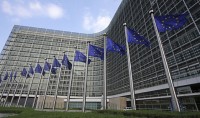European Union Adopts New Strategy to Contain Tech Firms
August 3, 2020
The European Union has led the movement to leverage antitrust laws in an effort to limit the power of Big Tech companies from the United States. Now, convinced that the impact of these efforts did not go far enough to change behavior, they are pursuing a different tack, this time drafting regulations that address specific business practices. But even as the chief executives of Amazon, Apple, Facebook and Google were grilled in a Congressional hearing last week, they reported skyrocketing revenue and billions in profit.
The New York Times reports that, “the Justice Department is expected to announce an antitrust case against Google in the coming weeks … [and] the Federal Trade Commission and state attorneys general are also investigating Facebook, Apple and Amazon for potential anticompetitive behavior.” Efforts by European regulators to treat Big Tech companies “more like traditional industries such as telecommunications and finance” could “lead to a major overhaul of the region’s digital economy, where there are more than 500 million consumers.”

European Commission executive vice president Margrethe Vestager noted, “this is a new phase.” “At stake is whether or not these markets will be open and contestable and innovative, or if they will just be governed by these walled gardens of de facto monopolies,” she said.
In Europe, officials are also “investigating whether Apple’s App Store policies are anticompetitive, and are preparing charges against Amazon for abusing its e-commerce dominance to box out smaller rivals … [as well as] reviewing Google’s purchase of the wearables maker Fitbit, while Britain opened an inquiry in June into Facebook’s acquisition of Giphy.”
“Popular tech services are increasingly being developed outside of the EU,” said Computer & Communications Industry Association vice president Christian Borggreen. “The EU should strive to become a leader in tech innovation, not just in tech regulation.”
Until now, Europe’s efforts at containing Big Tech haven’t made much of a dent, including fining Google about 8.25 billion euros ($9.7 billion at current rates), a small amount for a company with $160 billion in annual revenue. These cases also take several years to complete, which gave Google “ample time to secure its dominance in online advertising, smartphone software and Internet search.” The General Data Protection Regulation, enacted in 2018, has thus far “been faulted for lack of enforcement.”
Among Vestager’s new ideas is the Digital Services Act, which “would draw more business boundaries for search engines, marketplaces, social networks and app stores.” The idea of “barring Amazon, Apple and others from giving their products preferential treatment in their digital stores” is also being floated. Vestager reported that, “there was broad political support for the ideas, which could become law by next year.” Other European countries considering their own regulation are the United Kingdom, Germany and France.

No Comments Yet
You can be the first to comment!
Sorry, comments for this entry are closed at this time.